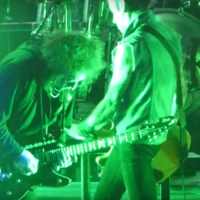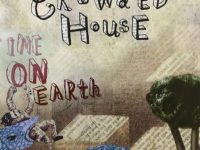I had difficulty coming to terms with Wish. Released on April 21, 1992, this LP felt like a return to form for the Cure, “like throwing arms ’round yesterday,” as Robert Smith sang here on “A Letter to Elise.”
It just wasn’t the form I particularly wanted.
In fact, the similarities with the Cure’s Kiss Me, Kiss Me, Kiss Me are striking, right down to the swooping opening track and the one or two icky-sticky radio-ready tunes. That 1987 release was as popular with a broader audience as it had been scattershot and essentially unsatisfying to me.
I was far more interested in its follow up, the brilliant and darkly consistent Disintegration from 1989. Then described as the Cure’s last album, it was a monsoon of pouting – and the kind of textured masterwork so interesting since it seemed to be produced by someone trying to get through something. It was, as the decade’s neon-lit promise receded, a depressing album for a depressing age. I loved it.
By way of contrast, the Cure’s occasionally frivolous Wish found Robert Smith doing something called “the unstuck.” More like “the uninspired,” I grumbled. This album, which arrived on the heels of 1990’s Mixed Up – a collection of singles handed over to various producers to be fiddled with – seemed to confirm for me the end of the Cure’s creative era.
Smith, in later interviews, said he had done Mixed Up simply to yank chains. A house mix? Consider mine yanked, I grumbled.
I was certain, back then, that the Cure’s Wish had backed out of every promise made by Disintegration, or even Mixed Up for that matter. It neither explored songs as canvases, nor overtly challenged the group’s core fanbase.
Time, however, has been surprisingly kind to Wish. What it did, instead, (and it’s no small thing, really) was rock.
The Cure finally – finally – split with slowly fading founding member Laurence Tolhurst, who had been relegated to “other instruments” on Disintegration. Added was former Cure roadie Perry Bamonte and, evidently, the kid liked to play. Almost every track on Wish had a guitar for its spine. That’s helped this album age surprisingly well. Where Disintegration shimmered, Wish screeched – and that doesn’t seem like such a bad thing anymore.
In the determinedly un-depressing age that followed my post-college years, albums with more layered complexities than the downer classic Disintegration – albums like Wish and, yes, Kiss Me, Kiss Me, Kiss Me – have concurrently risen in my estimation. I shouldn’t have been so hard on Wish, it’s clear. Though I still playlist around that silly unstuck business.
- ‘Together Through Life’ Remains One of Bob Dylan’s Most Low Key, Organic LPs - April 15, 2024
- Why Joe Jackson’s Retro ‘Body and Soul’ Said So Much About His Future - March 14, 2024
- How Rudolph Stole the Show on ‘The Temptations Christmas Card’ - December 25, 2023




